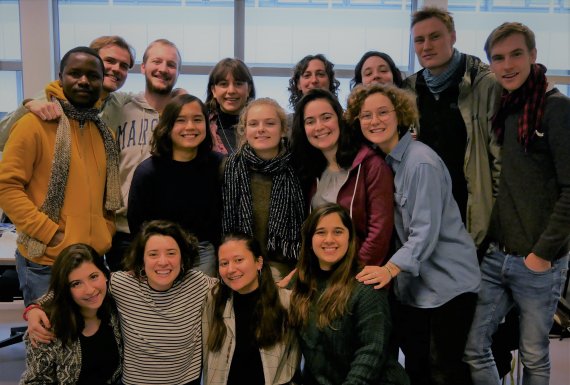The sixteen WUR-students/consultants. © Max van Deursen
‘New technologies are being developed at an ever faster rate. That makes it difficult for policymakers to regulate them properly: developments are going so fast that policymakers are constantly lagging behind. And these are complex topics. If these technologies are steered in the right direction with sound policy, they have the potential to close the gap between the rich and the poor. But if the policy is not sound, there is a risk that only rich countries will benefit.’
Quality of life
These are the words of Sara Mancinelli (24), Environmental Sciences Master’s student. She is one of the 16 WUR students doing the Academic Consultancy Training (ACT) project. The WUR students considered blockchains, 3D printing, Big Data and CRISPR while students from the State University of New York investigated genetic modification in humans and geoengineering.
Mancinelli and her little group looked at the opportunities and risks with 3D printing. ‘It is a disruptive technology that could lead to major improvements in the quality of life in developing countries. If you can 3D-print what you need on site, you disrupt the present supply chains. But if the focus is on how to use 3D printing for the military or space travel instead of for clothes, tools or medicines, for instance, that will put developing countries at a disadvantage.’
Max van Deursen (24), Climate Studies Master’s student, was in the blockchain team. ‘The technology came about because a bunch of nerds wanted to decentralize the banking sector. Now you see countries like China and companies like Facebook and Amazon producing their own cryptocurrencies and trying to centralize things again. It would not be a good idea for big companies to be in control here; this is the perfect moment to push the development in the right direction, for example by investing in start-ups and making knowledge about blockchain technology publically available.’
The students will present their findings on Wednesday 18 December in Impulse, from 16:00—17.30.

